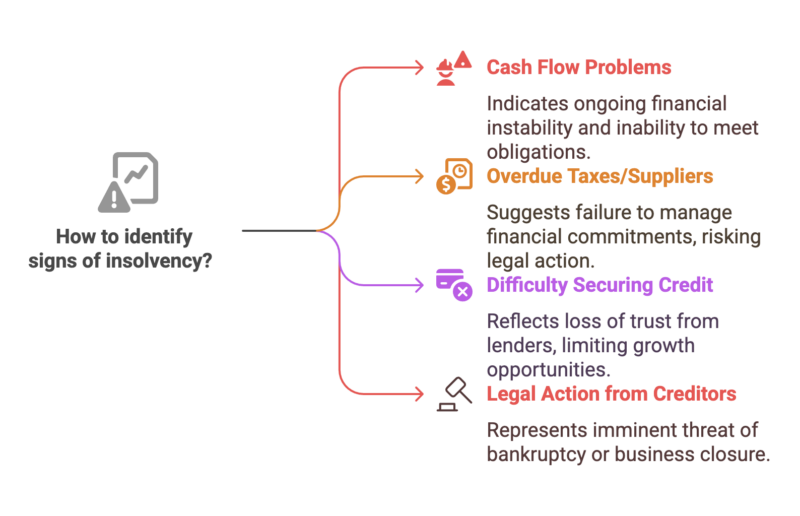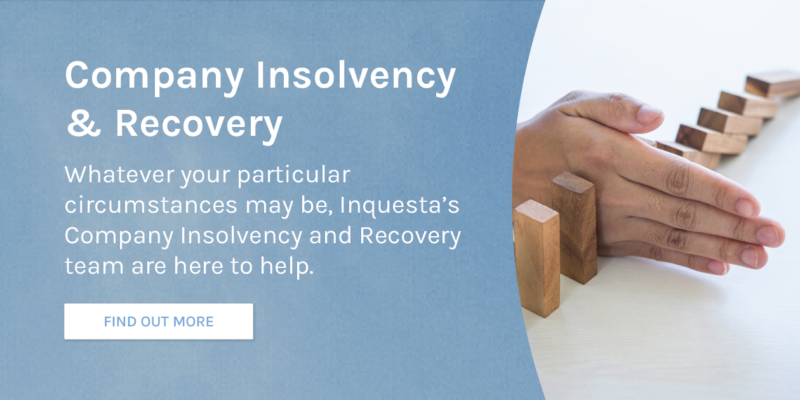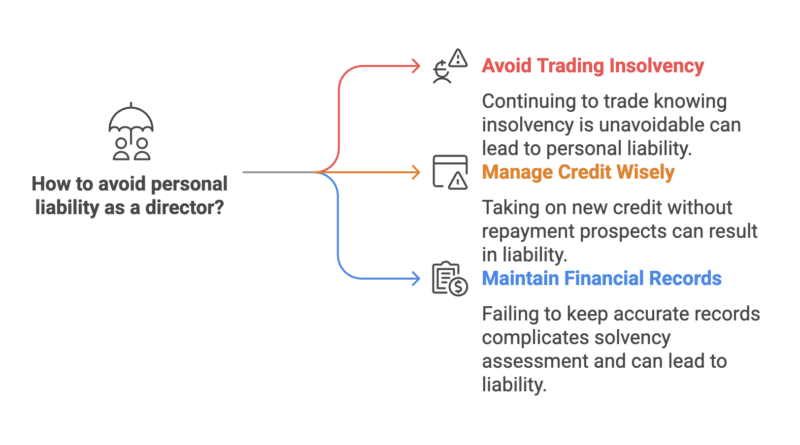Trading whilst insolvent is a serious matter that can have significant legal, financial, and reputational consequences for company directors, shareholders, and the business itself.
At Inquesta, we understand how challenging it can be for directors to navigate these complex situations. Our role is to offer clear guidance, support, and solutions that can help you comply with the law, protect stakeholders, and make better-informed decisions during a critical time.
Join us as we outline the key consequences of a limited company trading whilst insolvent, as well as explaining what you can do to avoid such pitfalls in the first place.
When is a Company Technically Insolvent?
Under Section 124A of the Insolvency Act 1986, a company is considered technically insolvent if it cannot pay its financial obligations as they fall due (cash flow insolvency), or if its liabilities exceed its assets (balance sheet insolvency). If unsure, seeking expert advice is crucial to avoid wrongful trading accusations and potential legal consequences.
For directors wondering when a company is technically insolvent, there are two ways of assessing this status:
- Cash Flow Insolvent: If a company cannot pay its debts as they become due. For example, if a company cannot pay its suppliers, employees, or creditors on time, it may be considered cash flow insolvent.
- Balance Sheet Insolvent: This occurs when a company’s liabilities have exceeded the value of its assets.
Directors are expected to prevent their company from trading whilst insolvent, if they know or it deemed that they should have known. By continuing to trade whilst insolvent, the director exposes themselves and the business to serious risk.
What is Trading Insolvent?
A limited company trading whilst insolvent refers to when a business continues to operate and, as a result, takes on new debts despite being unable to pay existing liabilities. This scenario is a clear indicator of financial distress and can have severe consequences for both the company and its directors.
Gaining a clear answer to the question “what is trading insolvent?” is crucial for any business owners and directors aiming to avoid potentially significant legal pitfalls. Some of the common warning signs of insolvency are:
- Persistent cash flow problems.
- Overdue taxes or unpaid suppliers.
- Difficulty securing credit or loans.
- Legal action from creditors, such as winding-up petitions.

Consequences of a Limited Company Trading Whilst Insolvent
The consequences of a limited company trading whilst insolvent can be severe, including wrongful trading liability, personal director liability, disqualification, creditor legal action, enforced liquidation, and potential criminal charges. Directors must be aware of the serious legal, financial, and personal consequences that can arise from failing to act appropriately.
Below are the primary risks associated with limited company trading whilst insolvent:
1. Wrongful Trading Liability
As per the Insolvency Act 1986, directors have a legal duty to act in the best interests of creditors when their company is insolvent. If a director continues trading despite knowing they are insolvent, or that insolvency is unavoidable, they can be held personally liable for increasing company debts. This is a key aspect of a company director’s liability for insolvent trading.
It’s important to note that wrongful trading does not require fraudulent intent — it simply refers to continued operations when there is no reasonable prospect of recovery. If the company were to enter liquidation, the liquidator will investigate whether the director acted responsibly. If proven guilty of wrongful trading, they may be required to personally contribute to repaying company debts.
2. Personal Liability for Company Debts
Directors are usually protected by limited liability. This means that, ordinarily, company debts do not affect the personal finances of directors. However, if one is found guilty of wrongful or fraudulent trading, this protection may be removed.
A director may be deemed personally liable if they:
- Continue to trade knowing insolvency is unavoidable.
- Take on new credit without the prospect of it being repaid.
- Fail to keep accurate financial records, making it harder to assess company solvency.
3. Director Disqualification
If a limited company trades whilst insolvent, directors can face disqualification under the Company Directors Disqualification Act 1986. This results in a ban from acting as a director or holding a management position in any company for up to 15 years.
Disqualification may be sought if:
- The director fails to minimise creditor losses.
- There is evidence of mismanagement and/or financial misconduct.
- The company’s records show signs of wrongful or fraudulent trading.
A disqualification order can severely impact a director’s future post-insolvency and liquidation of their business. Breaching a disqualification order could even lead to criminal prosecution.
However, in some circumstances, it may be possible for a disqualified director to be able to act as a shareholder. For more information on this process, read our dedicated blog.
4. Legal Action from Creditors
When a company is not able to pay its debts, creditors have the right to take legal action in order to recover what they are owed. The most drastic step creditors can take in this scenario is the issuing of a winding-up petition, which can lead to enforced liquidation if a winding-up order is issued. This will result in assets being sold to repay debts, and the business being closed.
Other measures creditors could take include:
- Seeking County Court Judgements (CCJs): Makes it significantly harder to obtain future finance.
- Apply for a Statutory Demand: Statutory demands require payment within 21 days before escalation.
- Enforcement: Asset seizure via bailiffs/enforcement agents.

5. Forced Liquidation of the Company
When an insolvent company continues trading, despite its status, it can expect to be placed into compulsory liquidation in short order. This can happen through a number of different ways:
- A creditor’s winding-up petition as a result of unpaid debts.
- A court order, following an investigation into suspected wrongful trading.
- Director-initiated liquidation, if they assess the situation and accept the business is no longer a viable entity.
When in liquidation, the company’s assets will be seized and sold in order to repay creditors. The business is then removed from the Companies House register — meaning it officially ceases to exist.
6. Potential Criminal Charges for Fraudulent Trading
Company directors found guilty of committing misconduct in the lead up to insolvency could face charges of fraudulent trading under Section 213 of the Insolvency Act 1986.
Scenarios that could lead to accusations of fraudulent trading include:
- Deliberately misleading creditors.
- Falsifying financial information.
- Attempting to hide assets.
Fraudulent trading effectively refers to any scenario where a company incurs debts without any obvious ability, or intention, to ever repay it. Authorities take fraudulent trading extremely seriously. Any attempts made to deceive creditors can have serious legal consequences, including:
- Prison sentences of up to 10 years.
- Lifetime director bans.
- Unlimited fines, to be determined by the severity of the fraud.
What Should Directors Do?
Is your company insolvent or nearing insolvency? Directors must act quickly to protect stakeholders and comply with legal obligations. Continuing to trade without a recovery plan risks company directors’ liability for insolvent trading, reputational damage, and the legal consequences we’ve outlined elsewhere. Early action and professional advice is essential to navigate this challenging situation.
Here’s what you should do:
- Immediately cease trading (if there is no reasonable prospect of recovery).
- Seek professional advice from an insolvency practitioner as soon as possible.
Explore formal insolvency procedures. This can include administration, liquidation, or Company Voluntary Arrangement (CVA). This is key to protecting creditors and ensuring you comply with your legal obligations.

Protect Your Business and Your Future with Expert Insolvency Support
Trading whilst insolvent is a serious matter, one that can have far-reaching legal, financial, and reputational consequences for directors, shareholders, and the company itself. The risks of wrongful trading, personal liability, director disqualification, and even criminal charges underscore the importance of acting both swiftly and responsibly whenever financial difficulties do arise.
At Inquesta, we specialise in providing expert guidance as well as offering tailored solutions aimed at helping directors to navigate the most complex of legal challenges. Whether you’re facing insolvency, or simply wish to ensure you’re complying with your legal obligations, our team of licensed insolvency practitioners is on hand to help and support you every step of the way.
Don’t wait until it’s too late. Contact Inquesta today for a totally confidential consultation and learn more about how we can help you protect your business, your reputation, and most importantly, your future. Let us help guide you towards the best possible outcome during this critical time.
Inquesta:
Helping Businesses Thrive, Even in Tough Times.
📞 [0800 093 4604] | 📧 [[email protected]] | 🌐 [https://inquesta.co.uk]
Disclaimer: This blog is for informational purposes only and does not constitute legal or financial advice. For tailored advice, please consult a qualified insolvency practitioner at the links above.



